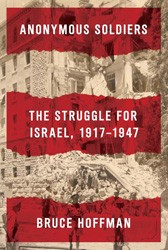Aplaque on Ussishkin Street in Jerusalem, a short walk from where I live, marks the spot where a sixteen-year-old boy named Alexander Rubowitz was abducted by British police and murdered on May 6, 1947. He had been distributing news posters for the underground group LEHI, also known as the Stern Gang.
At that time the British colonial administration was battling terrorist acts by LEHI as well as the Irgun Zvai Leumi, two dissident Jewish military groups separate from the Jewish Agency’s official Hagana army. The War Office appointed a war hero named Roy Farran to head a counterterrorist group to smash the Jewish guerilla units. He confessed to murdering the Jewish boy, but his written confession was judged inadmissible at his court-martial and he was acquitted.
British historian David Cesarani, whose Becoming Eichmann won a National Jewish Book Award, recounts this scandal of coverup, conspiracy, and diplomacy in the context of the last years of the British Mandate in Palestine. Major Farran’s Hat is a history of those years that closely scrutinizes the personalities of the leadership and the decisions they made as Britain’s hold on its empire was becoming increasingly tenuous and desperate. It is also a gripping, suspenseful account of a government’s intentional perversion of justice. Treating the Rubowitz case as a microcosm of the struggle for a Jewish state sheds new light on these world-historical events as well as on the case itself. Index, notes, sources.
Bob Goldfarb is President Emeritus of Jewish Creativity International.





